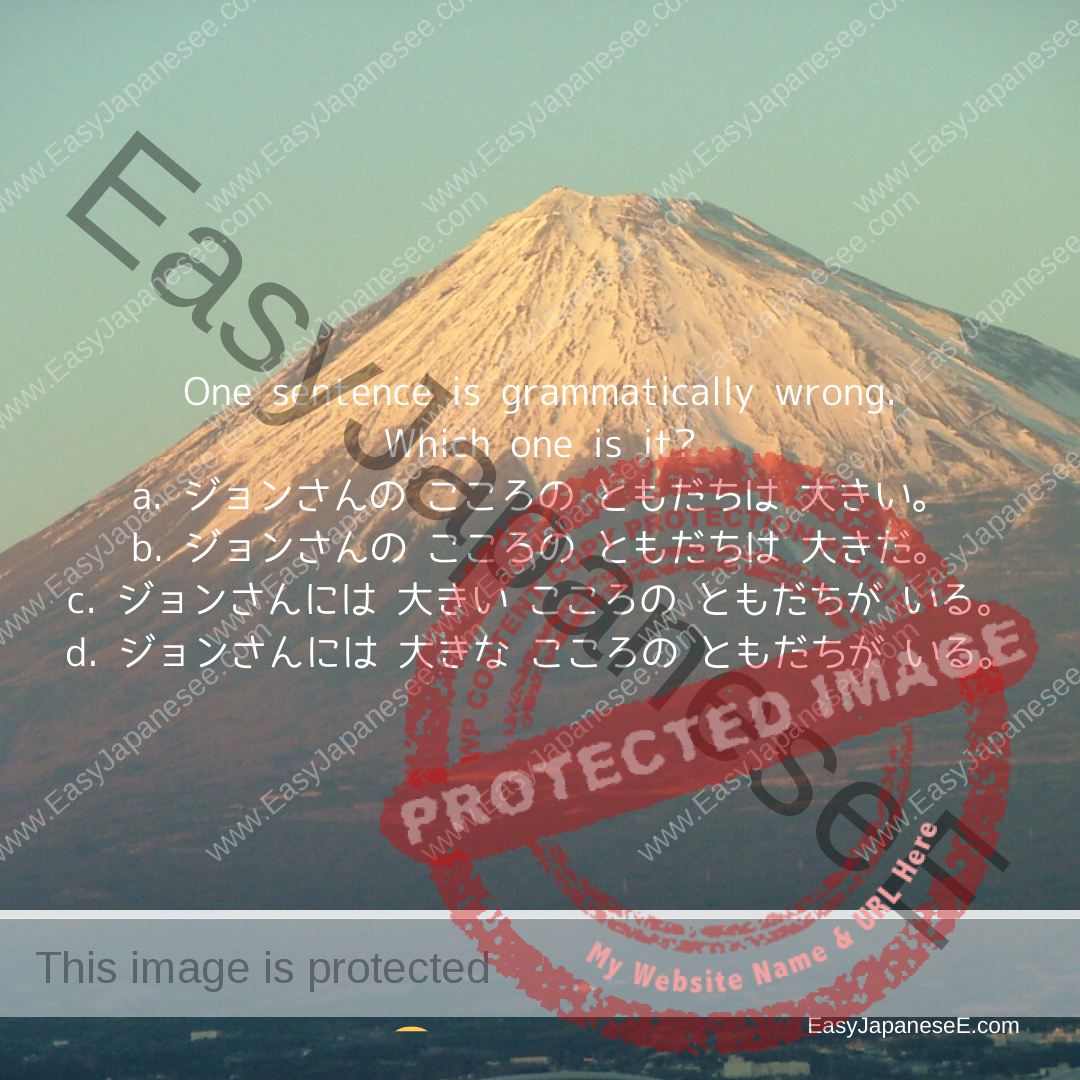One sentence is grammatically wrong. Which one is it?
- ジョンさんの 心の 友達は 大きい。
- ジョンさんの 心の 友達は 大きだ。
- ジョンさんには 大きい 心の 友達が いる。
- ジョンさんには 大きな 心の 友達が いる。
大きい and 大きな both mean “big.” There is no clear difference in meaning. So if you have just started to study Japanese, the only thing you need to remember is that 大きな is NOT a なadjective and it has to have a noun afterwards – i.e. you cannot use it at the end of a sentence like the above b. This is because 大きな is classified as 連体詞, which is translated as “a prenoun adjectival” or “a noun adjunct” (it’s not important to remember these grammar jargon but you need to know the difference in function/usage) and that means it can only be used in front of a noun.
So the answer to the above question is 2. You cannot replace な of 大きな with だ to end a sentence.
If you are studying for the JLPT N5 exam, stop reading here.
Question to an advanced learner
If you are an advanced learner, I have another question for you: are the images of John’s friend described in the other 3 sentences (1, 3 and 4) the same?
I said there is no clear difference in meaning but it does not mean that there is no difference. Native speakers do choose one over the other depending on the context, so I will try to explain it today.
大きな is more conceptual while 大きい is more factual.
If you are planning to buy a big bag, you can walk into a shop and say either:
大きな カバンを ください。
or
大きい カバンを ください。
If there is no context to think of, the above 2 sentences are almost the same. However, if they brought out 2 bags of difference sizes and if you want a bigger one, you say:
大きい カバンを ください。(or more like 大きいの (= the big one) or 大きい方 (= the bigger one) を ください。)
When you talk about the actual size, 大きい is preferred over 大きな.
大きな is more preferred when the subsequent noun is for something conceptual rather than real.
エマさんは 大きな 夢を 追っています。
Emma is chasing a big dream.ダンさんは 大きな プロジェクトに 取り組んでいます。
Dan is working on a big project.
Some native speakers may say they would use 大きい instead of 大きな in the above sentences, but I think more native speakers will choose 大きな over 大きい here.
However, if you swap 夢ゆめ (dream – conceptual) with 馬 (a horse – real), プロジェクト (project – conceptual) with 絵 (painting – real), most native speakers will find 大きい more preferable than 大きな.
エマさんは 大きい 馬を 追っています。
Emma is chasing a big horse.ダンさんは 大きい 絵に 取り組んでいます。
Dan is working on a big painting.
Again, using 大きな instead of 大きい here is not wrong either and in fact some native speakers may say that they prefer that way.
Even though the differences are very small, based on the above 2 points, let’s talk about the second question I asked. Before I start talking about the meaning, though, I will first apologize for the strange choice of words. Today’s example sentences are not great at all. However, in order to make my point, I needed to pick a rather unusual combination of words.
a. ジョンさんの 心の 友達は 大きい。
John’s soul mate is big. (In this case 大きい more likely means “physically big” rather than anything else)c. ジョンさんには 大きい 心の 友達が いる。
In this sentence 大きい sounds more like describing 友達 (real) rather than 心(conceptual), so the whole sentence means more like: John has a big soul mate.
And in this case 大きい can be for “physically big” but can also be for “significant” or “important.”d. ジョンさんには 大きな 心の 友達が いる。
In this sentence 大きな sounds more like describing 心 (conceptual) rather than 友達 (real), so the whole sentence means more like: John has a friend with a big heart.
These interpretations of sentences, especially of c and d, are not conclusive and final. Depending on the context and where the stress is placed, they can be interpreted either way, but I just wanted to show that there is some difference between 大きい and 大きな.


One Reply to “大きい vs 大きな”